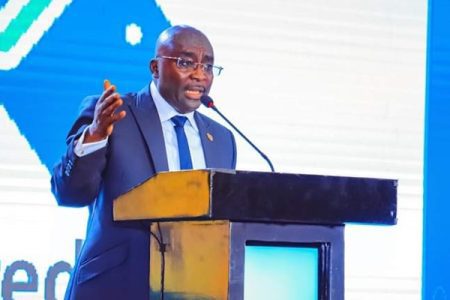In a groundbreaking step towards financial inclusion and economic empowerment, Vice-President Dr. Mahamudu Bawumia has launched MyCreditScore, Ghana’s first individual credit scoring platform.
This transformative initiative seeks to modernize Ghana’s financial ecosystem by offering a three-digit credit score for each user, allowing financial institutions, landlords, employers, and other service providers to evaluate creditworthiness swiftly and reliably.With MyCreditScore, Ghana is poised to build a financially literate, economically empowered society where access to credit becomes a stepping stone to realizing personal goals, expanding businesses, and driving national development.
How mycreditscore works
Unlike traditional credit assessment methods that rely on banking history alone, Dr Bawumia said MyCreditScore uses data from various sources such as mobile money transactions, utility payments, and demographic details tied to the Ghana Card.
By harnessing information beyond conventional credit activity, the system brings a more inclusive credit scoring model to the forefront, providing a credit score for individuals with little or no formal banking history.
The platform calculates creditworthiness by assessing payment history, debt levels, and financial habits, distilling them into a single, transparent score that lenders and other institutions can trust.
The system tracks and updates each person’s score based on their financial actions, rewarding responsible borrowing and timely repayments.
This approach not only benefits borrowers but also allows lenders to make more informed lending decisions, reducing overall risk in Ghana’s financial sector.
Addressing Ghana’s financial challenges
The introduction of MyCreditScore addresses longstanding issues in Ghana’s credit landscape, including limited access to credit and high lending costs due to the high default risk associated with borrowers’ limited credit histories.
Dr Bawumia pointed out how high non-performing loan (NPL) rates have plagued Ghana’s financial institutions, with the country’s NPL rate reaching a staggering 24.3% in August 2024.
He explained that MyCreditScore aims to reduce this burden by providing a standardized, transparent credit assessment system, making lending safer for banks and other financial bodies.
According to him, data from MyCreditScore’s pilot phase indicated a promising reduction in NPL rates, dropping to just 1.4% compared to the 20.7% average NPL ratio recorded in 2023.
He said this drastic improvement suggests that the new credit scoring model can significantly enhance the quality of credit assessments, encouraging more responsible lending and borrowing practices across the financial sector.
Financial empowerment and accessibility
For Ghanaians, MyCreditScore brings new possibilities in personal finance.
Individuals who previously had no access to formal credit systems due to lack of banking history now have a pathway to financial credibility.
A good credit score can unlock better interest rates on loans, access to credit cards, and the ability to make significant purchases—providing a level of financial freedom that was previously unattainable for many.
Vice-President Dr Bawumia highlighted the system’s potential to help Ghanaians manage their financial health proactively. MyCreditScore provides alerts on any changes to one’s score, enabling individuals to take control of their credit profiles and address issues before they impact future financial opportunities.
This transparent scoring system is expected to foster a culture of financial responsibility and empowerment, as users better understand the implications of their financial choices.
Boosting economic growth and financial inclusion
For the economy, Dr Bawumia said MyCreditScore represents a monumental step toward sustainable growth and financial stability.
The system mitigates information asymmetry between lenders and borrowers, reducing risks for financial institutions and enhancing access to credit for small and medium-sized enterprises (SMEs).
This shift can drive entrepreneurship and innovation, as Ghanaian entrepreneurs gain access to credit that fuels business growth and job creation.
With the support of the Bank of Ghana and credit bureaus, MyCreditScore is part of a larger government vision for an inclusive financial ecosystem where more Ghanaians can access credit and participate in economic opportunities.
Since creditworthiness is now more accurately assessed, even previously underserved segments of the population have a chance to enter the formal credit economy.
A catalyst for financial literacy and stability
The creation of MyCreditScore signals a renewed commitment to transparency and responsibility within Ghana’s credit system.
By using the Ghana Card as a unique identifier, the system centralizes credit information and fosters a unified credit reporting landscape.
Furthermore, Dr Bawumia said MyCreditScore aligned Ghana’s financial sector with global best practices, encouraging a proactive approach to credit management.
By understanding their credit scores and financial habits, Ghanaians can make more informed decisions about borrowing, saving, and investing, ultimately contributing to national economic resilience and individual financial security.
A Future of financial empowerment
The launch of MyCreditScore sets the stage for a more inclusive and resilient financial future in Ghana.
As a credit score serves as a “financial report card,” Ghanaians can now demonstrate their creditworthiness confidently, whether applying for a loan, securing a lease, or negotiating job offers.
This initiative empowers individuals, provides businesses with a trusted credit evaluation tool, and strengthens the economy as a whole.
Vice-President Dr Bawumia aptly noted that MyCreditScore is “a pathway to opportunity, helping unlock the potential of every Ghanaian,” and positioning the nation as a leader in financial inclusivity and innovation across Africa.
By ELVIS DARKO, Accra
- Friday, May 9, 2025 Newspaper Headlines - 9 May 2025
- Adangabey brightens rural kids’ future from his wheelchair - 9 May 2025
- Stanbic donates ICT equipment to UHAS for digital learning - 9 May 2025

